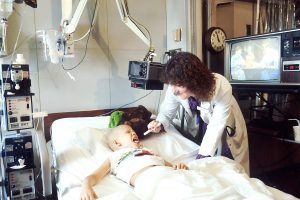
Want to take your nursing career to the next level? Consider a Master’s level nurse practitioner program.
Nurse practitioners are registered nurses with advanced knowledge and skills which qualifies them to diagnose and treat patients as independent health care providers. These nurses are in high demand in Canadian health care services, making it an excellent career choice.
This article takes a brief look at what working as a nurse practitioner entails. Then we discuss the steps you need to take to qualify as a nurse practitioner and provide a list of some Canadian universities which offer the Master’s degree.
Admission Requirements For Nurse Practitioner Programs
You need to be a registered nurse before you can be admitted to a nurse practitioner program at a university. You also need to have qualified as a nurse with a Baccalaureate degree because the program is at Master’s level.
Individual nursing schools usually have further requirements, such as a minimum grade average, usually at least a B average, in your undergraduate program.
A further requirement is that you must have worked full-time as a registered nurse for at least two years after obtaining your nursing license.
Completing a Nurse Practitioner Program
The next step is to decide whether you want to qualify as an adult, pediatric, or primary health care nurse practitioner and then select the nursing school where you will complete your Master’s degree. You might want to consider how the program fits in with your location, finances, and time available.
The nurse practitioner Master’s programs between nursing schools differ considerably. This includes costs, curriculum, and teaching methods – which range from mostly in-person classes to fully online, and clinical practice requirements.
You might also want to consider whether the program is recognized for licensure as a nurse practitioner in the province where you plan to work.
Generally, the duration of programs is a minimum of two years full-time. Some programs provide for part-time study, allowing you to work and study, but then it will take longer to complete your degree.
For those who already have a Master’s degree in nursing, some universities offer a nurse practitioner diploma where you will get credit for foundation courses so that fewer credits are required.
You can find details about nurse practitioner programs on the websites of the nursing schools that offer the program.
This includes information about entry requirements, the application process, closing dates, and the curriculum. The websites also often provide information about available scholarships, bursaries, and loans.
As a starting point, a list of some of these nursing schools is provided at the end of this article.
Apply to the program/s of your choice as soon as possible to make sure that you can collect all the required documentation and complete the application process in time for the next student selection.
Nurse Practitioner Licensing

You cannot start working as a nurse practitioner as soon as you have your degree in hand. You first have to obtain your license to practice in the province where you plan to work. In Canada, each province has its own regulatory authority, or college of nursing, which is responsible for licensing.
This means that, once again, licensing requirements for nurse practitioners differ according to the laws in each province. The websites of most of the provincial colleges of nursing provide detailed information on the registration process for nurse practitioners.
Good news for the future, however, is that the Canadian Council of Registered Nurse Regulators is currently working on standardized national licensing requirements. This will streamline the movement of nurses across provinces and ensure the right level of regulation nationally.
Requirements for Registration as a Nurse Practitioner in Ontario
As by far the most nurse practitioners in Canada work in Ontario, the following is a brief overview of the requirements of registering as a nurse practitioner with the College of Nurses of Ontario. Full details are available on their website.
In this province, nurse practitioners are registered as an Extended Class of nurses in adult health care, pediatrics, or primary health care. They may use the initials EC or NP after their name.
While there are regulations for the registration of nurse anesthetists, the highest paid category of nurse practitioners in the USA, none have been registered in Ontario to date.
The applicant must be registered as a nurse in Ontario and have completed a nurse practitioner program recognized by the College of Nurses in Ontario.
If you qualified at another institution, a registration committee would be tasked with assessing your qualification and competency, which will delay the registration process.
You will be required to submit numerous forms – some completed by you and others by third parties. You also need to pay an application fee.
Applicants have to:
- Provide proof of fluency in spoken and written English or French
- Be a Canadian citizen, permanent resident of Canada, or be authorized to practice nursing under the Immigration and Refugee Protection Act.
- Demonstrate safe nursing practice, showing that they have practiced safely for at least two of the past five years. This includes references from employers specifying hours, your role, job description, and more.
- Sign a Declaration of Registration Requirements testifying to your good character and suitability to practice. This includes questions about criminal offenses, previous misconduct hearings or reduced nursing licensure, and any physical or mental conditions which could affect safe practice.
Nurse Practitioner Licensing Examination
Before being licensed as a nurse practitioner, you will also need to pass an examination approved by the College of Nursing of Ontario. They will provide you with information on how to apply for the examination after you have submitted your completed application.
The examinations are either the Canadian Nurses Association Canadian Nurse Practitioner Examination (CNPE) for Primary Health Care, or that of the American Nurses Credentialing Center for all three streams.
You will need to pay an examination fee and then a registration fee once your license is granted.
Maintaining your License
In Canada, nurse practitioners have to renew their licenses every year, according to the requirements of the college of nursing or the particular province.
Generally practitioners will have to show that they have practiced a specified number of hours during the past number of years.
For example, in British Columbia, you need to have worked as a nurse practitioner for at least 900 hours during the preceding three years. In Alberta, the requirement is 1,125 hours in the past five years.
For license renewal, nurse practitioners also have to provide proof of having maintained competence through self-reports, peer assessments, and continuing education programs.
Nurse Practitioner Programs in Canada

The following are some of the university nursing schools that offer nurse practitioner programs in Canada:
Ontario
- University of Toronto, Toronto
Master of Nursing (MN-NP), with Adult, Pediatric or Primary Health Care-Global Health options.
The degree is accessible to students across Canada. The coursework is online, with three on-campus residencies over the course of study, and clinical practicals are individually designed.
- University of Ottawa, Ottawa
Master of Science Nursing (MScN) and Post-Master’s graduate Diploma, providing for the Primary Health Care option.
The program is full-time or part-time, and coursework is a combination of face-to-face and distance education.
British Columbia
- University of Victoria, Victoria
Master of Nursing (NP) and Nurse Practitioner Post-Degree Diploma providing for the Primary Health Care option.
Programs are web-based but students are required to attend skill-building on-site for 3-5 days each term. Must be resident in BC and hold active registration to practice in the province.
- University of British Columbia, Vancouver
Master of Nursing (MN NP) exemptions can be considered for those who previously completed equivalent courses at graduate level.
Alberta
- University of Alberta, Edmonton.
Master of Nursing (MN NP) and Post-Master’s option. Master’s degree with an advanced clinical focus in either Adult, Pediatric, or Primary Health Care.
Full-time or part-time study and the recently introduced new program offers have blended online and on-campus options.
Nova Scotia
- Dalhousie University, Halifax
Master of Nursing (MN) program providing for the Primary Health Care option.
Study is full-time over two years or part-time over three to five years.
Newfoundland and Labrador
- Memorial University, St John
Master of Science in Nursing (MScN) and Post-Master’s Nurse Practitioner Graduate Diploma.
Students must be residents and licensed to practice in Newfoundland.
New Brunswick
- University of New Brunswick, Fredericton Campus
Master of Nursing (MN.ANP) providing for the Primary Health Care option.
Coursework is a mix of online and in-person learning, and students must be licensed to practice in the province.
Saskatchewan
- University of Saskatchewan, Saskatoon.
Master of Nursing (MN NP) and Post-Master’s specialization certificate providing for the Primary Health Care option.
The degree can be completed either full-time or part-time. Classes are web-based with live web-conference seminars, allowing for distance education. Students need to do a one-week residency in Saskatoon, and clinical placements are done in settings across the province and the country.
Nurse Practitioners in Canada
Are Nurse Practitioners Recognized in Canada?
Nurse practitioners are legally recognized in all provinces in Canada as independent practitioners which means that they do not have to practice under the supervision of a medical practitioner.
They may consult with patients to:
- Diagnose and treat illness
- Order and interpret tests
- Prescribe medications
- Perform certain medical procedures
However, each province and territory has its own legislation for nurse practitioners. This is why their scope of practice – what they are permitted and not permitted to do – differs between provinces.
For example, in Ontario and some other provinces, nurse practitioners may admit and treat patients in hospitals, while in other provinces this is not permitted. The same applies to prescribing controlled substances and ordering certain patient investigations, like MRI scans.
Although nurse practitioners practice independently, they do often work as part of a health care team where there is continuous consultation and referral between team members.
Number of Nurse Practitioners And Average Salaries
In 2021 there were 7910 licensed nurse practitioners in Canada, up from 7136 in 2020. More than half of them (4266) were licensed to practice in Ontario.
The average salary differs considerably between provinces, with a wide range of between $61 360 – $130 104 in 2021. In Ontario, the range was $105 027 -$122 694. Nurse practitioner salaries were considerably higher than those of registered nurses with a range of $48 847–$93 795.
Where Do Nurse Practitioners Work?
In Canada, nurse practitioners can qualify in one of three streams:
- Adult health care
- Pediatric health care
- Primary health care
The majority are qualified in primary health care, which is the care provided across all age groups at the first point of contact with the health service.
Nurse practitioners work mainly in community care, which includes community clinics, health care centers, physician’s offices, government-sponsored nurse practitioner-led clinics, and patients’ homes.
Some, however, are also employed in long-term nursing homes and in hospitals’ outpatient clinics and emergency services.
Most nurse practitioners in Canada are employed rather than having their own private practice, mainly because of health care payment systems.
Your Future As a Nurse Practitioner
Nurse practitioners are becoming an indispensable part of the Canadian health care system, given the increasing demand for health care services and the shortage of medical practitioners in general practice.
Nurse practitioners are well-paid, and the number of positions for these nurses is increasing at a faster rate than for most other jobs.
Completing a Master’s degree to qualify as a nurse practitioner, whether full-time or part-time, will be challenging. However, it will be worthwhile for your future career.
Written by Frieda Paton
Frieda is a registered nurse and published author with extensive experience throughout her career in research, scientific writing and journalism.
She has now turned to writing full time to share her passion for health and wellness, helping readers to prevent and manage chronic conditions. Frieda lives and works in the small museum town of Pilgrim’s Rest in South Africa.
Read Relevant Posts Here









